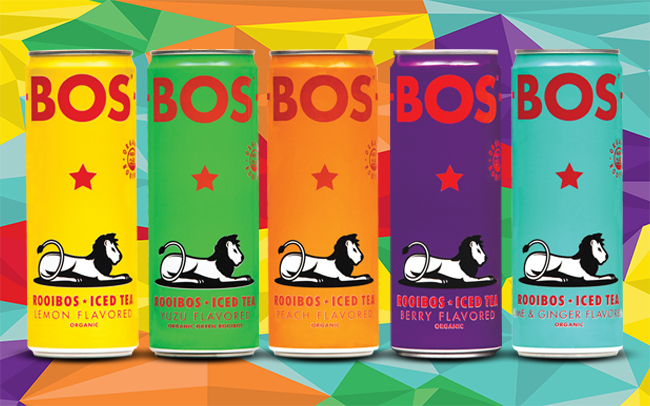After several fits and starts, are U.S. consumers finally ready to fully embrace ready-to-drink rooibos tea?
That’s the question facing South African tea brand BOS as it rolls out its line of iced rooibos teas in the States, which began last month when it launched at Sprouts locations nationwide. The company, founded in 2011 in Cape Town, has established a presence in its home market and some European countries, but has particularly ambitious plans for the U.S. Speaking with BevNET, CEO and co-founder Dave Evans said he expects, if things go according to plan, that America will represent 50 percent of the company’s total business within the next three years.
In bringing a RTD rooibos product to the States, BOS is hoping to develop a category which has struggled to find meaningful traction domestically. Over the last decade, brands such as Honest Tea, Kalahari, Bhakti, ZT, Wicked Lekker, the kid-focused Bossi, and others have marketed products with rooibos as either the main ingredient or part of a tea blend with varying degrees of success.
What BOS brings to the States is a track record of success in South Africa, where the drink — usually served hot — is a staple of the national diet. Since creating the brand in 2011, founders Grant Rushmere, a beverage entrepreneur who sold his previous company, Afro Cafe, to Red Bull in 2007, and Richard Bowsher have captured 12 percent of the RTD iced tea market in the country, divided between conventional retail and on-premise sales.
Over the last three years, as its product portfolio has grown to include loose-leaf rooibos tea, tea bags, a sports drink and multi-serve formats, BOS has expanded outside of its home territory with successful launches in France, the Netherlands, Belgium, Switzerland, Sweden and Spain. It has also earned the support of investors, including venture capital fund Invenfin and former Manchester United manager Sir Alex Ferguson.
Its ability to build an audience for the product is thanks in part to a playful attitude towards marketing, which includes everything from bike-based brand ambassadors to more ambitious tech plays, such as a tweet activated vending machine and an augmented reality smartphone app (think Pokémon GO, but for planting virtual trees).
Outside of the national launch at Sprouts, BOS plans to focus initially on building a presence in Southern California, where it is currently in between 500 and 600 locations. In determining where to stage the brand’s U.S. launch, Evans noted that Southern California “ticked a lot of boxes in terms of a cultural fit” with South Africa, thanks to mutual interest in warm weather, surfing and consumer demand for healthy lifestyle products.
“It’s a great market for us because consumers are interested in trying innovative new products, and, in terms of our brand positioning, we are all about healthy fun lifestyle, which matches really well with character of Southern California,” said Evans, who joined the company in 2011 and is also an investor. “All around it’s a great place to build awareness, encourage trial and get traffic.”
For its initial U.S. launch, BOS will be available in five flavors — Lemon, Lime & Ginger, Yuzu, Peach and Berry — with sugar-free SKUs set for introduction later this year, followed by multi-serve bottles in late 2019. The 12 oz. cans have a suggested retail price of $1.99 each.
Evans said he believes the combination of taste, health benefits and marketing will help BOS succeed where other rooibos-centric brands have stumbled in the past. He noted that, because rooibos is naturally caffeine-free and rich in antioxidants, the product is appealing to kids and adults.
“We are renowned for bright colorful iconic cans with the strong iconography, and really bringing a lot of fun and great energy to the packaging,” he said. “People want healthy products but they also want fun and energy.”
For its U.S. production, Evans said that BOS ships its organic rooibos tea and flavors to a co-packer in Arizona. As the company scales its U.S. operations, BOS has the capacity to meet potential increased demand while still sourcing its organic rooibos from its existing farms in the Cederberg mountain range outside Cape Town.
“For us, it’s about trying to build up a presence in the U.S. over next couple of years,” Evans said. “In long run, it should become a very big source of business.”
